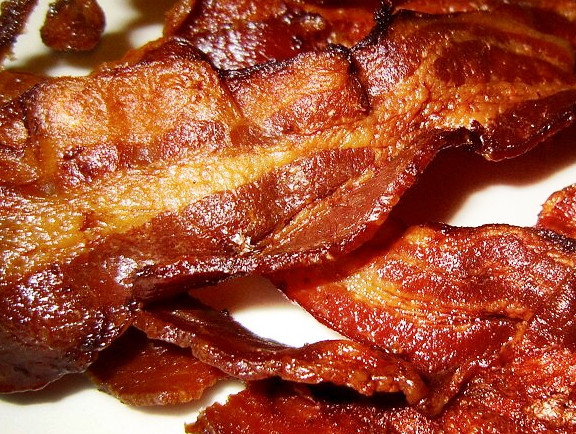
Bacon is a special gift from God – one of the tasty ways by which he tells us, “I love you.”
I don’t have a Bible verse for that, but I’m convinced.
In my case, bacon has been a healthful “diet food.” With its optimal fat-to-protein ratio, it played a role in my losing 40 pounds in three months. It was part of my dietary strategy – along with intermittent fasting – to reverse my type 2 diabetes. My hemoglobin A1C score plummeted from 8.5 to 5.2.

Of course, I didn’t always believe bacon was a health food. I thought it was unfit for human consumption. In fact, I believed eating it was sinful – and not merely because it’s “sinfully delicious.”
Bacon Bandits
Growing up in the Armstrongs’ Worldwide Church of God, I was deprived of bacon and all other foods considered “unclean” according to the Levitical laws they observed.
But I didn’t feel deprived. I was content. I never coveted the pepperoni or sausage on my classmates’ school cafeteria pizzas, because as pork products they were “unclean” toppings. Why would I want to eat something God forbids?
It’s right there in Leviticus 11 and Deuteronomy 14. The God who says, “I change not” (Malachi 3:6) clearly delineates between “the living creature that may be eaten and the living creature that may not be eaten” (Leviticus 11:46).

By promoting this simplistic understanding, the Armstrongs and their associates acted as “bacon bandits.” In the name of God, they stole from our menu this perfect health food, along with shrimp (the fruit of the sea), crab, catfish, and any other edible flesh proscribed by the Law of Moses.
They taught that these dietary restrictions were health laws. God knows what’s good and what’s not good for us to eat. So, like a Toyota owner’s manual, his Book tells us what fuel to use and what not to use for our body’s best performance.
Spiritual explanations
When I was older, however, I began hearing spiritual explanations, which sounded more rational. (I didn’t think I knew anyone who chronically battled trichinosis due to rebelliously eating undercooked, parasitic pork flesh.)
It was said that these dietary laws were daily reminders that we are called out of this world, and that choosing to eat “clean” meats and choosing not to eat “unclean” meats served as a living metaphor for how we must choose between good and evil in our everyday life.
Just as we choose God in our thoughts, in our speech, and in what we watch, we also choose God in what we eat.
Then a few years after I began working at the home office of Garner Ted Armstrong’s Church of God International in Tyler, Texas, I was challenged by a couple friends on this issue of clean and unclean meats. One of them offered mostly secular arguments, which I rejected entirely, while the other posed deeper theological arguments.
Back to the Word
That challenge was a call to arms, so to speak. It was time to “sharpen my sword” and yet again “prove” to myself – and to my friends – what I thought I already knew: the Christian mandate to abstain from “unclean meats.”
So I blew a day’s worth of dust off my Bible and again reviewed the relevant passages. (I had not yet taken Catholicism seriously, and instead had a very Protestant “Bible only” mentality.)
This time, as I sought to contradict my friend’s point of view, my new study was leading me in an unexpected direction. While I didn’t want to jump to premature conclusions, I felt I might have to revise my understanding.
I had already gotten past the Fundamentalist, bumper-sticker mentality of “The Bible says it – I believe it – that settles it.” Sure enough, the Bible has to be believed, but first it must be correctly understood, which is what I sincerely endeavored to do.
What I found
I don’t want to oversimplify the issue, but for brevity’s sake I can say that one passage of Scripture encapsulates the core of what eventually changed my mind (and later practice). It’s a passage that perfectly summarizes and explains the purpose of the clean and unclean distinctions with regard to food. And that is Leviticus 20:24-26:
But I have said to you, ‘You shall inherit their land, and I will give it to you to possess, a land flowing with milk and honey.’ I am the Lord your God, who has separated you from the peoples. You shall therefore separate the clean beast from the unclean, and the unclean bird from the clean. You shall not make yourselves detestable by beast or by bird or by anything with which the ground crawls, which I have set apart for you to hold unclean. You shall be holy to me, for I the Lord am holy and have separated you from the peoples, that you should be mine.
It seemed clear from this verse alone that the primary reason God made these dietary laws was to reflect or illustrate that God had chosen the people of Israel out of all the other nations. It was “therefore” – because of that – that they were to distinguish between the clean and unclean. Just as God set apart Israel from the nations, so he set apart for them unclean animals.
I didn’t want to flip-flop my position based on one verse alone, in case I read too much into it, but this same concept popped up everywhere else, including our go-to chapters of Leviticus 11 and Deuteronomy 14:
In Leviticus 11, after its listing of which animals are clean and unclean, we come to verse 45:
For I am the Lord who brought you up out of the land of Egypt to be your God. You shall therefore be holy, for I am holy.
In Deuteronomy 14, in the same context as these and other laws of distinction, we encounter verse 2:
For you are a people holy to the Lord your God, and the Lord has chosen you to be a people for his treasured possession, out of all the peoples who are on the face of the earth.
Peter’s vision
I realized that this explicit Old Testament reason for the dietary laws fits perfectly with the account of Saint Peter’s vision in Acts 10.
Peter didn’t want to eat all the animals, reptiles, and birds he was told to eat, because he knew they were unclean. He objected, saying, “I have never eaten anything that is common or unclean,” but the voice from heaven replied, “What God has made clean, do not call common.” This happened three times in the vision, underscoring its importance.
Now, COG preachers explain (sometimes bombastically) that the meaning of Peter’s vision “has nothing to do with food! It has nothing to do with pig, shrimp, lobster…!” (video). They say his vision only relates to the legitimacy of Gentile believers.
But they don’t grasp the implications of this connection between the Levitical dietary laws and God’s covenant people.
The obvious question…and answer
To me, there was no way around the logical question that demanded a logical answer:
If we believe…
- that God gave Israel the dietary laws of clean and unclean as a reminder that God separated them from all the nations to be his people,
- that the Gentiles are “grafted in” to God’s people (Romans 11), and
- that the apostle to the Gentiles wrote, “For as many of you as were baptized into Christ have put on Christ. There is neither Jew nor Greek, there is neither slave nor free, there is no male and female, for you are all one in Christ Jesus” (Galatians 3:27-28),
…then why on earth are we observing a dietary practice that symbolizes something that is no longer the case?
By insisting we abstain from “unclean” meats, we are acting out and illustrating a false reality – one in which the nation of Israel is still being called to be separate and spiritually distinct from the Gentiles.
The fact is that Jesus, for the past 2000 years, has been calling all peoples – Jew and Gentile – to be united in the one universal Church he continues to build.
It therefore makes no sense to continue observing these laws today. The religious symbol no longer matches the reality. As foretold to the patriarchs, the Church does not make a distinction between Jew and Gentile; rather, all are equally “in Christ.”
It’s safe to say it was God himself who generously saw fit to add Gentile bacon to the Church’s cheeseburger, making it an ever more glorious burger.
Ken’s Pizza
It wasn’t until I was completely convinced by the Christian understanding of clean and unclean laws that I told my friend one weekend, “Let’s go out for a pizza.”
We went to Ken’s Pizza on Broadway Avenue in Tyler. I was in my upper 20s, and for the first time ever I enjoyed multiple slices of pepperoni pizza.
Since I was still employed by a church that taught against eating unclean meats, I looked over my shoulder as I ate, but I saw no one I needed to worry about.
There was only one former fellow church employee a few tables over, but she was eating the same things I was.

Conclusion
I realize that in telling how I arrived at this point, I have not addressed the objections often raised by those who abstain from “unclean” animals (e.g., Isaiah’s reference to mice, Noah’s knowledge of clean and unclean animals, etc.), but that’s not the point of this post. It’s not a polemic. It’s me sharing a slice of my story.
I do find it tragic and even humorous these days looking back on people’s reactions when they learned I had left the religion of my youth. It was not uncommon to hear them ask with incredulity, “You mean, you eat pork now?” As if that is the surest sign of going off the rails into apostasy.
It’s sobering to consider that there are Bible readers – good people (I was one of them!) – who think that Christianity is centered around worshiping on the correct day of the week, or is based on a particular fanciful prophetic scenario, or is fortified in the Faith by checking the label on a can of beans to make sure it doesn’t contain pork – even checking a bag of marshmallows or a box of gelatin to make sure it doesn’t contain “animal shortening,” lest it include any pork byproducts (yes, that is a thing).
Obedience to God in all things is necessary, but not misdirected obedience.
When I read the lives and writings of the holy Christian saints of old, their concern was not food and drink – that which comes into the mouth. Their concern was with what comes out of the mouth (cf. Matthew 15:11) – that is, what’s in the heart.
Eating animals without cloven hooves or that don’t chew the cud isn’t what defiles us or makes us unclean. It’s our own sinfulness.
In the words of Jesus,
What comes out of a man is what defiles a man. For from within, out of the heart of man, come evil thoughts, fornication, theft, murder, adultery, coveting, wickedness, deceit, licentiousness, envy, slander, pride, foolishness. All these evil things come from within, and they defile a man. (Mark 7:20-23)
Our job is to let God graciously cleanse our spiritual wounds (we all have them) and shape us perfectly into his image.